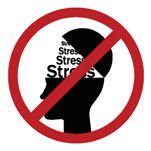 When I was in my early twenties, I found myself getting nervous around people who I deemed to be more intelligent than me. I hated silence. I would start talking and rambling and would try to be funny to ‘break the ice’ or more specifically, what I wrongly perceived to be tension.
When I was in my early twenties, I found myself getting nervous around people who I deemed to be more intelligent than me. I hated silence. I would start talking and rambling and would try to be funny to ‘break the ice’ or more specifically, what I wrongly perceived to be tension.
Sometimes it worked, sometimes it didn’t. I didn’t realise back then that I was showing symptoms of the first of three stages of stress as outlined by the Stress Foundation. In case you were wondering about the difference between symptoms and signs of stress: symptoms are what you experience, e.g. breathlessness, and signs are detected (or measured) by a doctor, e.g. a fast heart rate. There can be overlaps and some might even argue that there is no real distinction between the two.
Other symptoms I experienced that are typical of this stage were: talking quickly; eating and drinking faster; working at high speed and for long period of time, without tiring (whilst undertaking the activity).
Through time, if we don’t deal with our negative stressors (extreme stimuli which are often injurious, unpleasant, and can arouse fear or anxiety), we could become irritable; confrontational; experience tension headaches, migraines, insomnia, heart burn; and increase our consumption of alcohol and food, and smoke more. These are all attributed to the second stage of stress.
The last stage can show ‘cotton-wool head’; palpitations, chest pain, heart attacks; depression and anxiety; tiredness, lack of energy; severe guilt / shame; and physical illness.
Negative stress affects us on a physical, behavioural, psychological and emotional level.
These are some things to look out for when either the demands placed on us outweigh our perceived ability to cope or our perceived ability to cope outweigh the demands placed on us:
On a physical level:
- Decreased energy
- Muscle tension
- Sighing
- poor posture
- colds and flu
- rapid breathing
On a behavioural level:
- boredom / frustration
- poor concentration
- lack of awareness
- fatigue
- increased smoking / coffee consumption
On a psychological level:
- lack of confidence
- forgetful
- inability to make decisions
- time urgency
On an emotional level:
- distress
- quick temper
- impatient
- irritable
- lack of humour
However, when the demands far outweigh our perceived ability to cope, we can lose our sex drive, withdraw socially, experience helplessness, depression, become violent, hostile, etc.
If you want to read more on the affects of stress then you may find these websites useful – http://www.hse.gov.uk/stress/furtheradvice/signsandsymptoms.htm and http://www.nhs.uk/Conditions/Stress/Pages/Symptoms.aspx.
If you are like me and love reading non-fiction books then I thoroughly recommend the book, Teach Yourself Managing Stress by Professor Terry Looker and Dr Olga Gregson. Here you will find a comprehensive guide to stress and the management of negative stress.
When confronted with negative stressors try to take a step back and remember past similar experiences that you successfully overcame. Imagine yourself as someone, perhaps a role model, able to be calm: you may start to become calm – by having a new viewpoint you could overcome the negative stressor. On a slight digression, people with anger issues are taught to have a different understanding of the situation, which can help dissolve the anger almost immediately. In a similar way, I find imagining myself as someone who has the skills I need to overcome an obstacle really effective.
You may find making a list of all the things on your mind can help you gain control. Also, taking a deep breath in will activate the vagus nerve. This can induce relaxation. I will provide more tips in my next blog post.
But if you are experiencing high levels of stress then you may find cognitive hypnotherapy extremely beneficial to help treat your difficulties and problems and to regain control of your life. Sometimes we can deal with issues when they arise but often we become so engrossed in countless demands that we lose the ability to manage our stress levels. Also, if you are experiencing tension with loved ones or work colleagues, cognitive hypnotherapy can help you see new perspectives and different ways of communicating.
You can test your stress levels: http://www.mindtools.com/pages/article/newTCS_82.htm. I was taught that if your score is 80-100 then your stress levels are a little high; over 100 suggests that you are under serious stress; over 200 indicates potential development of a stress-related illness.
An alternative test -The Coopers Life Stress Inventory can be found at: http://stresscourse.tripod.com/id26.html.
One more test, the Glazer Stress Control Lifestyle Questionnaire – ftp://ftp.islandnet.com/sarbc/stress.pdf. I will explain in my next blog post the differences between type A and type B personalities.
In my final blog post in this series on stress management I will provide tips on how to manage your stress through time management, relaxation techniques as well as the effects of diet and sleep on our stress levels.










